Celia McAlpine – 19 December, 2021
‘Uhila was equally at ease discussing the philosophical nature of his body of work with participants as he was simply chatting about the beautiful weather in Auckland. 'You may look at me and think, what a waste of time,' ‘Uhila says at one point, perhaps a wry jab at any cynics watching. This theme was also the topic of his 2016 thesis, entitled 'Maumau-taimi: Wasting Time; Being Useless,' which looks at perspectives of 'wasting time', and questions cultural perceptions of time in Tonga, Aotearoa and beyond.
Wellington
Kalisolaite ‘Uhila
Kalanga /To Shout
Part of Performance Art Week Aotearoa
11th - 13th of November, 2021, from 3:30pm - 5pm
Kalisolaite ‘Uhila is an award-winning performance artist born in Tonga, and based in Tāmaki Makaurau Auckland. His work is unrehearsed and unfolds organically, often exploring themes of identity, inequality, connection, and alienation. As part of PAWA (Performance Art Week Aotearoa) November 2021 and in response to the event’s theme of ‘Public/Private’, ‘Uhila performed the work Kalanga/To Shout.
Kalanga is a Tongan word meaning ‘to speak at the top of one’s voice.’ In a ceremony or a fono (a gathering of people) one or many voices are heard, and echo from the privacy of the gathering to the public. At a church, the church choir sings in the privacy of its church and becomes public when you can hear the singing out on the road. The gathering or fono becomes both private and public.
Kalanga aims to activate the private and/or public space between the audience and the artist by broadcasting audio from ‘private’ conversations with participants into the public sphere. Viewers could either listen as an invisible witness to conversations as they were broadcast into the street, or engage and become part of the performance by talking with Kalisolaite via Zoom, using their own device or the computer in the MEANWHILE art gallery in Wellington.
Kalanga instantly evoked questions about who is the observer and who is the artist, as a participant had as much control and direction over the piece as ‘Uhila simply by engaging in conversation. And by way of its somewhat barebones focus on these unstructured chats, this piece also spoke to the enduring tradition in performance art of making ordinary human activity a public spectacle.
Though I’ll admit I’m sometimes sceptical of this genre of art, I was pleasantly surprised at the profound effect this work had at forcing me to pay close attention and carefully consider each moment of dialogue. The conversation was placed under the proverbial microscope of the work, and this conferred a level of significance to the sometimes mundane nature of the chats, elevating the content of each sentence beyond the sum of its parts. Phrases floated past like little snippets of poetry, each one special and sacred in the context of the audience listening.
‘Uhila was equally at ease discussing the philosophical nature of his body of work with participants as he was simply chatting about the beautiful weather in Auckland. ‘You may look at me and think, what a waste of time,’ ‘Uhila says at one point, perhaps a wry jab at any cynics watching. This theme was also the topic of his 2016 thesis, entitled Maumau-taimi: Wasting Time; Being Useless, which looks at perspectives of ‘wasting time’, and questions cultural perceptions of time in Tonga, Aotearoa and beyond.
As PAWA this year took place amidst the ongoing Delta outbreak, ‘Uhila was unable to leave Auckland to perform his piece onsite in Wellington as was originally intended. This very necessary digital layer introduced a larger physical and mental distance between artist and participant than perhaps originally intended, which somewhat disrupted the flow of the work. At times the conversation splintered and stuttered due to patchy audiovisual quality. Despite this, ‘Uhila still managed to project a very genuine presence, connecting with each participant regardless of these additional barriers. Moments of silence imposed by digital became amplified, quiet spaces between the ebb and flow of the words that did make it through the added gauntlet of pixelated sound and bad internet.
Ultimately though, I think the words of Bruce E. Phillips on ‘Uhila’s work perfectly sums up the impression I left with: There is nothing terribly new about what he has done, but it’s the ability that he has to socially intervene in the here-and-now to what is happening in this city that makes a profound work.
Celia McAlpine
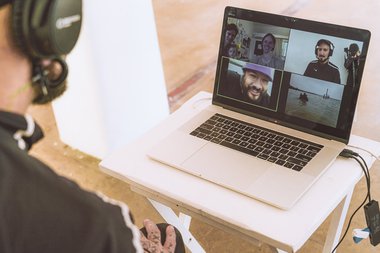
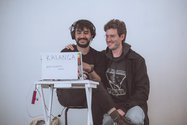
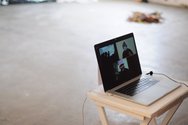
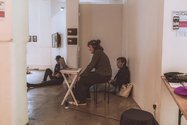
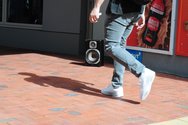
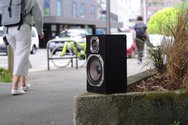
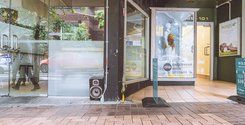
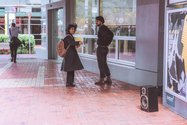
 Advertising in this column
Advertising in this column Two Rooms presents a program of residencies and projects
Two Rooms presents a program of residencies and projects
This Discussion has 0 comments.
Comment
Participate
Register to Participate.
Sign in
Sign in to an existing account.